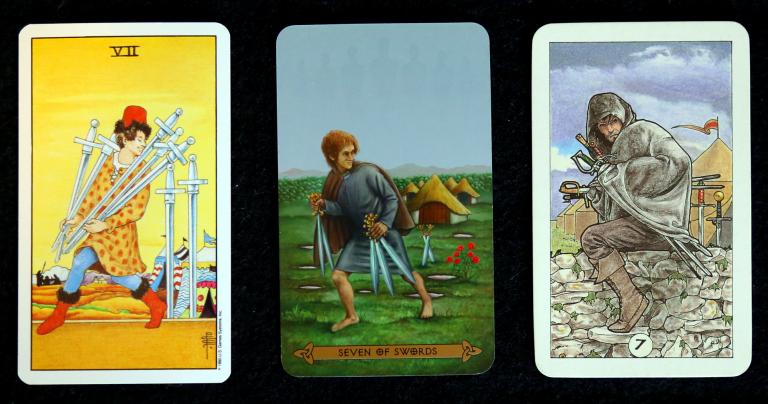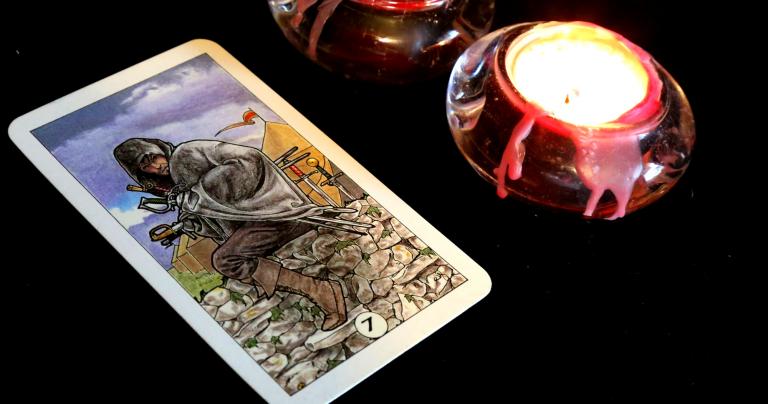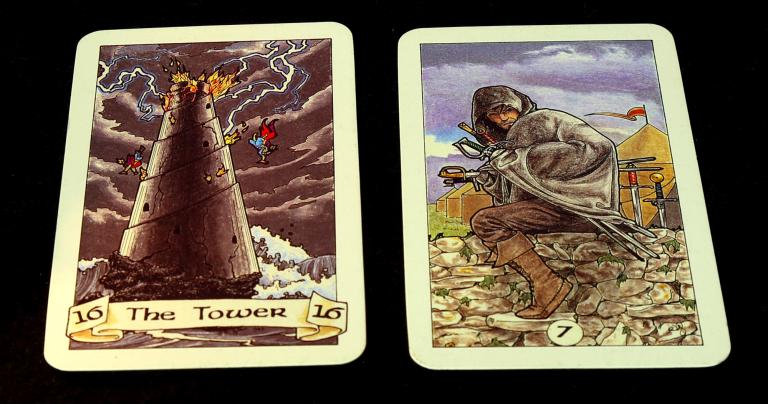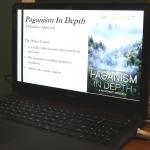We’ve been talking a lot about The Tower lately, but another card is starting to show up with a disturbing regularity: the Seven of Swords. It’s come up with a frequency and in positions that have gotten my attention, and not just in my own readings. That’s usually a sign that it’s doing more than simply providing an answer to the questions asked. Rather, the forces and trends the Seven of Swords represents are becoming more prominent in the wider world.
In the commonly used Waite-Smith deck, the Seven of Swords shows a man running away from an encampment, possibly a military camp or maybe the site of a medieval tournament. He’s carrying five swords, while two more swords remain behind. The man is looking back, possibly with regret at the two swords he’s leaving behind because he can’t carry them, or more likely to see if anyone has noticed him. He’s carrying the swords by the blades – it’s likely he’s going to get cut sooner or later.

The man is almost certainly stealing the swords. But the artwork tells us nothing about his circumstances or motivation. Is he an insurgent, trying to disarm an occupying enemy? Perhaps he’s a defector who’s decided he can no longer fight on this side? Is he a prankster who will eventually return the swords? Or is he a common thief who sees an opportunity to steal something he can sell in another town?
As always, the cards do not offer crystal clear communication. Their proper interpretation depends on their position in the spread and their relationships with other cards, and with the question at hand. It also depends on what the spirits or your own intuition point out to you as you examine the cards. Which details stand out, and which ones seem insignificant?
What can the Seven of Swords mean when it shows up over and over again during times like these?
Look out for thieves
Our society obsesses over “street crime” that costs hundreds of dollars and ignores “white collar” crime that costs millions. And it denies the existence of the legal theft that transfers billions from the poor and middle class to the ultra-wealthy.
A quote attributed to Al Capone says “a lawyer and his briefcase can steal more than ten men with guns.”
What theft is going on right now while we’re watching the world burn? I started to say “while we’re distracted” but it’s not like we’re all tied up watching D-list celebrities. We should be paying attention to climate change, to the horrific treatment of refugees at our border, to trade wars, and to vetting the candidates who promise to do something about all of it. But that doesn’t mean thieves aren’t taking advantage of this opportunity to enrich themselves at our expense.
And it’s not just money that’s being stolen. What theft of culture and religion that started centuries ago is still perpetuated today? What theft of lineage and heritage continues in the name of profit, conquest, and domination?
The Seven of Swords warns us to look out for thieves, and there are plenty of thieves in our midst.
Victims of theft are not powerless
The thief is stealing five swords. But from the way he’s holding them, it doesn’t look like he knows what to do with them. And two more swords remain – it’s likely that two good warriors can track down the thief and use the two swords to retrieve the stolen arms.
Likewise, we are not powerless. In the political realm, we have the power of the vote. Gerrymandering and voter suppression make it harder to use than it should, but if enough of us turn out, we can elect candidates who better reflect our values.
In the economic realm, we can choose how and where we spend our money, and we can work toward making ourselves less dependent on unethical and unreliable corporations. That’s easier said than done, but every bit helps, and there will come a time when traditional skills will be needed.
In the religious and magical realm, we are actively working to rebuild what was stolen from our ancestors when Christianity became the only acceptable religion. There are multiple ways that restoration can happen – let’s try as many of them we can and then congregate around the ones that work.
Would-be defectors need to follow their conscience
I really like the way Robin Wood drew the Seven of Swords in her Robin Wood Tarot. This person is harder and more serious than the thief from the Waite-Smith deck. But he’s sitting on a wall – literally sitting on the fence – trying to make up his mind to leave the camp and take as many swords as he can carry with him.
in 2013 Gordon White of Rune Soup wrote a post titled There Is The Rescue Mission And The Salvage Mission, where he said “really, truly, own the fact that you are required to extract wealth from a system that has suspended all rules and best practices.” That inspired two of my own posts, A Call to Piracy and Responding to a Dysfunctional Society. All three posts have the same theme: if you have to make a living in the mainstream corporate world, so be it. But use the money you make and the skills you learn to serve a higher calling.
The Seven of Swords reminds us that while changing loyalties is hard – and it should be hard – sometimes it’s the right thing to do.
Spying is dirty and dangerous and everybody does it
Maybe the figure with the swords isn’t a defector or a thief. Maybe he’s a rebel, an insurgent, a spy – someone from the other side who snuck in, saw what he needed to see, then spotted a “target of opportunity” on his way out.
I absolutely love the movie Atomic Blonde (2017). It’s not exactly a realistic depiction of spying during the Cold War, but it’s close enough for a popcorn movie, and Charlize Theron is amazing as Lorraine Broughton. Near the end, James McAvoy’s Percival – who’s a British agent but not exactly a good guy – has one of the best lines in the film:
“You fight the good fight, and then one day you wake up and you realize that all you were was Satan’s little helper.”
I have no desire to defend the CIA or their counterparts in other countries. I cannot ethically defend “magical espionage” either in this world or between the worlds. I’m not even going to call it “necessary.”
But I can’t pretend it doesn’t go on, because it does. And those who don’t do it are at a disadvantage to those who do.
Perhaps the Seven of Swords is telling you to beware of someone who isn’t what they seem to be. Or perhaps it’s telling you that you have an opportunity to weaken someone who’s working against you and yours, if you can operate with courage and stealth.
Just take care that you remember who you are, whose you are, and what really matters.
The Seven of Swords in Tower Time
I really like telling a story as I draw and place cards in a spread. Occasionally that story progresses from “at the heart of the matter” to “the final outcome” in a straightforward, linear fashion. More frequently, though, I can’t get a clear picture until all the cards are in their places. Cards inform, clarify, and give context to other cards.
We are living in Tower Time, when structures built on weak foundations crumble and crash, causing chaos for those who’ve built their lives in and on them. These people – whether they are patriarchs, oligarchs, or plutocrats – will not give up their power easily.
This is the context for the Seven of Swords.
I’m not particularly fond of this combination. I would much prefer The Magician in the context of the Three of Cups, or even the Nine of Pentacles in the context of The Star. But that’s not the world we live in.
Forewarned is forearmed.


















